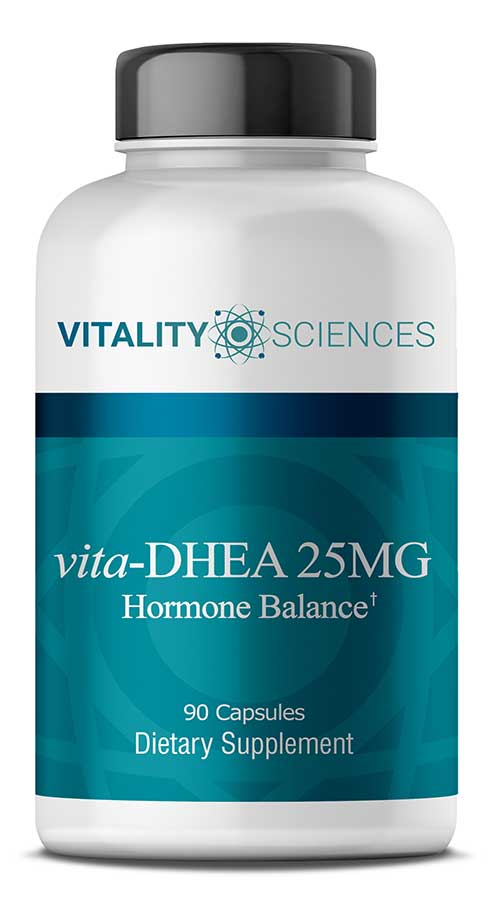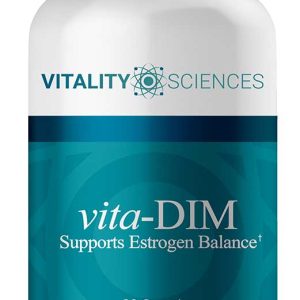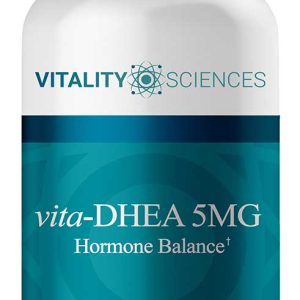Description
Overview
DHEA is a steroid hormone secreted primarily by the adrenal glands and, to a lesser extent, by the testes and ovaries. DHEA and its sulfate, DHEAs, are the most abundant steroid hormones in the human body and can be found in blood, saliva, urine and cerebrospinal fluid (CSF). [1] DHEA serves as a “buffer” reservoir to be used for the intracellular synthesis of various estrogens and androgens throughout the human body. DHEA production peaks during the second decade of life. Beginning in the early 30s, DHEA levels typically decline by 10% per decade. In addition to the normal decline associated with aging, other possible causes of a decline in DHEA production include inflammation, blood sugar imbalances, as well as long-term stress. Secretion of DHEA is affected by pituitary adrenocorticotropic hormone (ACTH) secretion. In addition to being a precursor for sex hormone formation, DHEA also serves as a cortisol antagonist, maintaining normal inflammatory balance and protection to brain tissues from free radical stress. It is especially important in the hippocampus, where excessive cortisol secretion can affect mood regulation and memory. DHEA has been shown to reverse classic stress-induced physiological responses and support healthy aging. DHEA supplementation is particularly important for those that have been found to be deficient through testing, as well as those that need cortisol to DHEA ratio support.
Mood Regulation†
Elevated cortisol levels can play a major role in normal mood regulation. DHEA counterbalances high levels of cortisol and also brightens mental outlook. DHEA can easily cross the blood-brain barrier, which is crucial for supporting brain function. Supplementation with DHEA has been shown to support mood regulation by increasing levels of β-endorphins, quieting glutamate (N-methyl-D-aspartate) receptors and protecting against the effects of glucocorticoids in the brain. [2,3] In a double-blind, placebo-controlled trial involving 145 subjects, administration of DHEA for 8 weeks was found to have a positive effect in supporting mood regulation in 56% (43 of 77) of subjects who received DHEA versus 31% (21 of 68) of subjects in the placebo group. [4]
Bone Health†
DHEA has been examined in numerous studies for its role in supporting bone health. In a double-blind, placebo-controlled study using 50mg/day, DHEA supplementation improved bone turnover and decreased osteoclast activity in women older than 70 years. [5] An additional randomized placebocontrolled trial of 225 healthy women (ages 55 to 85 years) showed that oral dosing of 50 mg/day of DHEA for one year showed positive effects on markers of bone health.[6] Possible theories regarding DHEA’s ability to support bone health include DHEA functioning as a precursor for the formation of estradiol and androgens, which promotes healthy bone formation by increasing levels of insulin-like growth factor. [7]
Inflammatory Balance†
DHEA has been shown to maintain normal inflammatory balance by inhibiting the activation of nuclear factor-kβ and the secretion of inflammatory compounds such as IL-6 and IL-2.[8] Maintaining normal inflammatory balance has been shown to be crucial in patients with gastrointestinal (GI) challenges. In a study involving 20 patients with GI challenges given 200 mg/day of DHEA for 56 days, 12 of 20 patients demonstrated a significant improvement in well-being, specifically related to inflammatory pathways that affect GI health. [9]
Aging†
Research has indicated that DHEA naturally supports healthy aging. In a study of 75 healthy subjects, aged 90 to 106 years, a correlation between DHEA levels and well- being was examined. It was found that in elderly men, those with the highest DHEA levels had the highest level of functioning. [10] An additional study examined 280 healthy individuals ages 60 to 79 years. In this study, it found that oral doses of 50 mg of DHEA per day supported bone health and libido. DHEA supplementation also improved skin health, in the areas of hydration, epidermal thickness and pigmentation, particularly in female participants over 70 years of age. [5]
Hormonal Balance†
DHEA is a precursor to estrogen and testosterone. In addition, DHEA may also have physiological actions unrelated to its function as a hormone precursor, as DHEA receptors are also present in human muscle cells. Clinical studies using oral doses of DHEA have demonstrated its ability in maintaining hormonal balance. In a study which included 20 women (ages 50-65 years) receiving 25mg/day for 12 months, DHEA promoted hormonal balance as soon as 3 months of DHEA administration. As indicated by serum concentrations, DHEA helped support healthy levels of testosterone, progesterone, estrone and estradiol.





Reviews
There are no reviews yet.